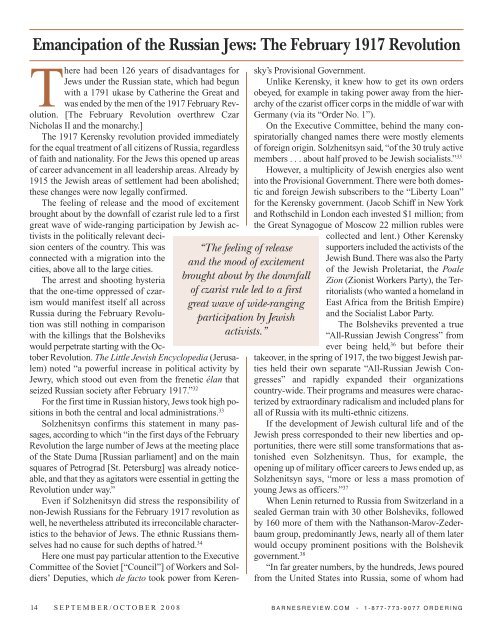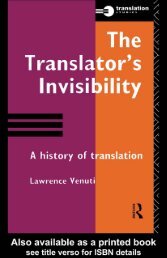WALENDYsolje-Russia-and-the-Jews
WALENDYsolje-Russia-and-the-Jews
WALENDYsolje-Russia-and-the-Jews
You also want an ePaper? Increase the reach of your titles
YUMPU automatically turns print PDFs into web optimized ePapers that Google loves.
Emancipation of <strong>the</strong> <strong>Russia</strong>n <strong>Jews</strong>: The February 1917 Revolution“The feeling of release<strong>and</strong> <strong>the</strong> mood of excitementbrought about by <strong>the</strong> downfallof czarist rule led to a firstgreat wave of wide-rangingparticipation by Jewishactivists.”There had been 126 years of disadvantages for<strong>Jews</strong> under <strong>the</strong> <strong>Russia</strong>n state, which had begunwith a 1791 ukase by Ca<strong>the</strong>rine <strong>the</strong> Great <strong>and</strong>was ended by <strong>the</strong> men of <strong>the</strong> 1917 February Revolution.[The February Revolution overthrew CzarNicholas II <strong>and</strong> <strong>the</strong> monarchy.]The 1917 Kerensky revolution provided immediatelyfor <strong>the</strong> equal treatment of all citizens of <strong>Russia</strong>, regardlessof faith <strong>and</strong> nationality. For <strong>the</strong> <strong>Jews</strong> this opened up areasof career advancement in all leadership areas. Already by1915 <strong>the</strong> Jewish areas of settlement had been abolished;<strong>the</strong>se changes were now legally confirmed.The feeling of release <strong>and</strong> <strong>the</strong> mood of excitementbrought about by <strong>the</strong> downfall of czarist rule led to a firstgreat wave of wide-ranging participation by Jewish activistsin <strong>the</strong> politically relevant decisioncenters of <strong>the</strong> country. This wasconnected with a migration into <strong>the</strong>cities, above all to <strong>the</strong> large cities.The arrest <strong>and</strong> shooting hysteriathat <strong>the</strong> one-time oppressed of czarismwould manifest itself all across<strong>Russia</strong> during <strong>the</strong> February Revolutionwas still nothing in comparisonwith <strong>the</strong> killings that <strong>the</strong> Bolshevikswould perpetrate starting with <strong>the</strong> OctoberRevolution. The Little Jewish Encyclopedia (Jerusalem)noted “a powerful increase in political activity byJewry, which stood out even from <strong>the</strong> frenetic élan thatseized <strong>Russia</strong>n society after February 1917.” 32For <strong>the</strong> first time in <strong>Russia</strong>n history, <strong>Jews</strong> took high positionsin both <strong>the</strong> central <strong>and</strong> local administrations. 33Solzhenitsyn confirms this statement in many passages,according to which “in <strong>the</strong> first days of <strong>the</strong> FebruaryRevolution <strong>the</strong> large number of <strong>Jews</strong> at <strong>the</strong> meeting placeof <strong>the</strong> State Duma [<strong>Russia</strong>n parliament] <strong>and</strong> on <strong>the</strong> mainsquares of Petrograd [St. Petersburg] was already noticeable,<strong>and</strong> that <strong>the</strong>y as agitators were essential in getting <strong>the</strong>Revolution under way.”Even if Solzhenitsyn did stress <strong>the</strong> responsibility ofnon-Jewish <strong>Russia</strong>ns for <strong>the</strong> February 1917 revolution aswell, he never<strong>the</strong>less attributed its irreconcilable characteristicsto <strong>the</strong> behavior of <strong>Jews</strong>. The ethnic <strong>Russia</strong>ns <strong>the</strong>mselveshad no cause for such depths of hatred. 34Here one must pay particular attention to <strong>the</strong> ExecutiveCommittee of <strong>the</strong> Soviet [“Council”] of Workers <strong>and</strong> Soldiers’Deputies, which de facto took power from Kerensky’sProvisional Government.Unlike Kerensky, it knew how to get its own ordersobeyed, for example in taking power away from <strong>the</strong> hierarchyof <strong>the</strong> czarist officer corps in <strong>the</strong> middle of war withGermany (via its “Order No. 1”).On <strong>the</strong> Executive Committee, behind <strong>the</strong> many conspiratoriallychanged names <strong>the</strong>re were mostly elementsof foreign origin. Solzhenitsyn said, “of <strong>the</strong> 30 truly activemembers . . . about half proved to be Jewish socialists.” 35However, a multiplicity of Jewish energies also wentinto <strong>the</strong> Provisional Government. There were both domestic<strong>and</strong> foreign Jewish subscribers to <strong>the</strong> “Liberty Loan”for <strong>the</strong> Kerensky government. (Jacob Schiff in New York<strong>and</strong> Rothschild in London each invested $1 million; from<strong>the</strong> Great Synagogue of Moscow 22 million rubles werecollected <strong>and</strong> lent.) O<strong>the</strong>r Kerenskysupporters included <strong>the</strong> activists of <strong>the</strong>Jewish Bund. There was also <strong>the</strong> Partyof <strong>the</strong> Jewish Proletariat, <strong>the</strong> PoaleZion (Zionist Workers Party), <strong>the</strong> Territorialists(who wanted a homel<strong>and</strong> inEast Africa from <strong>the</strong> British Empire)<strong>and</strong> <strong>the</strong> Socialist Labor Party.The Bolsheviks prevented a true“All-<strong>Russia</strong>n Jewish Congress” fromever being held, 36 but before <strong>the</strong>irtakeover, in <strong>the</strong> spring of 1917, <strong>the</strong> two biggest Jewish partiesheld <strong>the</strong>ir own separate “All-<strong>Russia</strong>n Jewish Congresses”<strong>and</strong> rapidly exp<strong>and</strong>ed <strong>the</strong>ir organizationscountry-wide. Their programs <strong>and</strong> measures were characterizedby extraordinary radicalism <strong>and</strong> included plans forall of <strong>Russia</strong> with its multi-ethnic citizens.If <strong>the</strong> development of Jewish cultural life <strong>and</strong> of <strong>the</strong>Jewish press corresponded to <strong>the</strong>ir new liberties <strong>and</strong> opportunities,<strong>the</strong>re were still some transformations that astonishedeven Solzhenitsyn. Thus, for example, <strong>the</strong>opening up of military officer careers to <strong>Jews</strong> ended up, asSolzhenitsyn says, “more or less a mass promotion ofyoung <strong>Jews</strong> as officers.” 37When Lenin returned to <strong>Russia</strong> from Switzerl<strong>and</strong> in asealed German train with 30 o<strong>the</strong>r Bolsheviks, followedby 160 more of <strong>the</strong>m with <strong>the</strong> Nathanson-Marov-Zederbaumgroup, predominantly <strong>Jews</strong>, nearly all of <strong>the</strong>m laterwould occupy prominent positions with <strong>the</strong> Bolshevikgovernment. 38“In far greater numbers, by <strong>the</strong> hundreds, <strong>Jews</strong> pouredfrom <strong>the</strong> United States into <strong>Russia</strong>, some of whom had14 S E P T E M B E R / O C T O B E R 2 0 0 8 B A R N E S R E V I E W . C O M • 1 - 8 7 7 - 7 7 3 - 9 0 7 7 O R D E R I N G







